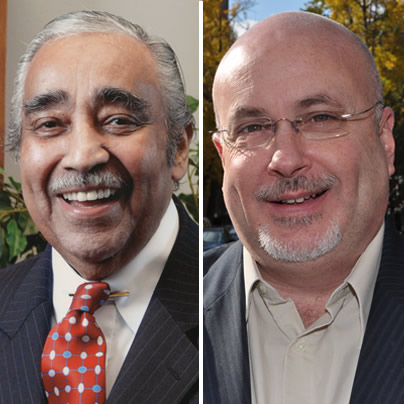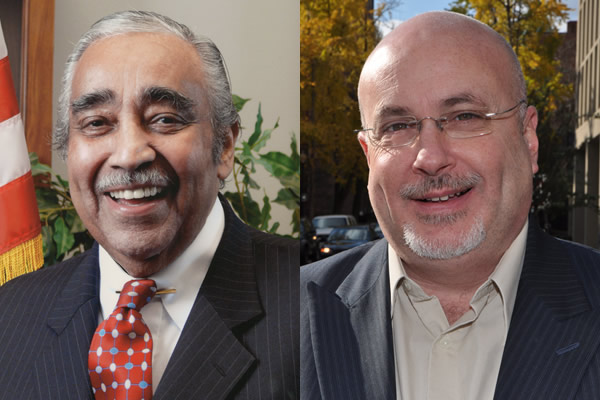Politics
Pocan, Rangel introduce bill for discharged gay veterans
N.Y. lawmaker calls on White House, Pentagon to support measure


Rep. Charlie Rangel (D-N.Y.) (left) and Rep. Mark Pocan are proposing legislation to ensure gay veterans have honorable discharge papers (D-Wisc.) (Photo of Rangel public domain, Washington Blade photo of Pocan by Michael Key)
More than 100 House members have introduced a bill to ensure gay veterans discharged because of their sexual orientation have “honorable” discharges as one co-sponsor is calling for White House and Pentagon support to help push the legislation forward.
Rep. Mark Pocan (D-Wis.), a gay lawmaker, introduced the Restore Honor to Service Members Act on Thursday, which would streamline the process for gay veterans to change their records to receive an “honorable” discharge if they were expelled for no reason other than sexual orientation.
During a conference call with reporters, Pocan said the bill would help the estimated 114,000 service members expelled because of their sexual orientation since World War II change their records if they were given an other than honorable or dishonorable discharge.
“While the repeal of ‘Don’t Ask, Don’t Tell’ was a landmark step toward equality in our military, tens of thousands of gay and lesbian veterans still have records that are marred with a range of discharges and designations,” Pocan said.
It’s unclear how many of these 114,000 service members discharged because of their sexual orientation — either under “Don’t Ask, Don’t Tell” or before that law was enacted — received designations of “other than honorable” or “dishonorable.” Many of the gay service members who receive these designations were expelled before “Don’t Ask, Don’t Tell” was signed into law in 1993.
Still, Pocan said these service members who received other than honorable or dishonorable discharges don’t have access to certain services — such as the ability the vote, receiving GI benefits or ceremonial burials — in addition to having difficulty finding employment.
Joining Pocan in leading the effort for the legislation is Rep. Charlie Rangel (D-N.Y.), a veteran of the Korean War who said the idea that service members expelled because of their sexual orientation would still have dishonorable discharges is un-American.
“The whole idea that just because of their sexual orientation that they will be given dishonorable discharges, bad discharges, blue discharges, less than desirable discharges is really inconsistent with everything that good Americans think that is fair, and they think that is equitable,” Rangel said.
But Rangel also stepped up the pressure on the Obama administration to help out with efforts to pass the legislation.
“We’re hoping we get this involved in the Department of Defense,” Rangel said. “We hope, too — we haven’t talked about it, Mark — but there’s no question we’re looking to get White House support as well.”
Rangel was optimistic the bill would find sufficient support for passage, even in the Republican-controlled House.
But upon the introduction, the Obama administration had little to say about the legislation. Lt. Cmdr. Nathan Christensen, a Pentagon spokesperson, said DOD policy is to “not comment on pending legislation.” The White House didn’t respond to a request to comment on the legislation.
The legislation currently has 105 sponsors, including Pocan and Rangel. The only Republican to co-sponsor the bill is Rep. Ileana Ros-Lehtinen (R-Fla.).
While a process exists for service members to change this designation, the legislation aims to streamline the effort.
“They don’t have a procedure to really upgrade what has been done,” Rangel said. “We are establishing now — an appropriate board would be set up to review the discharge. … Because of the problems that veterans have had, until Mark and I have come up this, there is no legislative solution.”
Congress
Congress passes ‘Big, Beautiful Bill’ with massive cuts to health insurance coverage
Roughly 1.8 million LGBTQ Americans rely on Medicaid

The “Big, Beautiful Bill” heads to President Donald Trump’s desk following the vote by the Republican majority in the U.S. House of Representatives Thursday, which saw two nays from GOP members and unified opposition from the entire Democratic caucus.
To partially offset the cost of tax breaks that disproportionately favor the wealthy, the bill contains massive cuts to Medicaid and social safety net programs like food assistance for the poor while adding a projected $3.3 billion to the deficit.
Policy wise, the signature legislation of Trump’s second term rolls back clean energy tax credits passed under the Biden-Harris administration while beefing up funding for defense and border security.
Roughly 13 percent of LGBTQ adults in the U.S., about 1.8 million people, rely on Medicaid as their primary health insurer, compared to seven percent of non-LGBTQ adults, according to the UCLA School of Law’s Williams Institute think tank on sexual orientation and gender identities.
In total, the Congressional Budget Office estimates the cuts will cause more than 10 million Americans to lose their coverage under Medicaid and anywhere from three to five million to lose their care under Affordable Care Act marketplace plans.
A number of Republicans in the House and Senate opposed the bill reasoning that they might face political consequences for taking away access to healthcare for, particularly, low-income Americans who rely on Medicaid. Poorer voters flocked to Trump in last year’s presidential election, exit polls show.
A provision that would have blocked the use of federal funds to reimburse medical care for transgender youth was blocked by the Senate Parliamentarian and ultimately struck from the legislation — reportedly after the first trans member of Congress, U.S. Rep. Sarah McBride (D-Del.) and the first lesbian U.S. senator, Tammy Baldwin (D-Wis.), shored up unified opposition to the proposal among Congressional Democrats.
Congress
Ritchie Torres says he is unlikely to run for NY governor
One poll showed gay Democratic congressman nearly tied with Kathy Hochul

Gay Democratic Congressman Ritchie Torres of New York is unlikely to challenge New York Gov. Kathy Hochul (D) in the state’s next gubernatorial race, he said during an appearance Wednesday on MSNBC’s “Morning Joe.”
“I’m unlikely to run for governor,” he said. ““I feel like the assault that we’ve seen on the social safety net in the Bronx is so unprecedented. It’s so overwhelming that I’m going to keep my focus on Washington, D.C.”
Torres and Hochul were nearly tied in a poll this spring of likely Democratic voters in New York City, fueling speculation that the congressman might run. A Siena College poll, however, found Hochul leading with a wider margin.
Back in D.C., the congressman and his colleagues are unified in their opposition to President Donald Trump’s signature legislation, the “Big Beautiful Bill,” which heads back to the House after passing the Senate by one vote this week.
To pay for tax cuts that disproportionately advantage the ultra-wealthy and large corporations, the president and Congressional Republicans have proposed massive cuts to Medicaid and other social programs.
A provision in the Senate version of the bill that would have blocked the use of federal funds to reimburse medical care for transgender youth was blocked by the Senate Parliamentarian and ultimately struck from the legislation, reportedly after pressure from transgender U.S. Rep. Sarah McBride (D-Del.) and lesbian U.S. Sen. Tammy Baldwin (D-Wis.).
Torres on “Morning Joe” said, “The so-called Big Beautiful Bill represents a betrayal of the working people of America and nowhere more so than in the Bronx,” adding, “It’s going to destabilize every health care provider, every hospital.”
Congress
House Democrats oppose Bessent’s removal of SOGI from discrimination complaint forms
Congressional Equality Caucus sharply criticized move

A letter issued last week by a group of House Democrats objects to Treasury Secretary Scott Bessent’s removal of sexual orientation and gender identity as bases for sex discrimination complaints in several Equal Employment Opportunity forms.
Bessent, who is gay, is the highest ranking openly LGBTQ official in American history and the second out Cabinet member next to Pete Buttigieg, who served as transportation secretary during the Biden-Harris administration.
The signatories to the letter include a few out members of Congress, Congressional Equality Caucus chair and co-chairs Mark Takano (Calif.), Ritchie Torres (N.Y.), and Becca Balint (Vt.), along with U.S. Reps. Nikema Williams (Ga.), Hank Johnson (Ga.), Raja Krishnamoorthi (Ill.), Delia Ramirez (Ill.), Joyce Beatty (Ohio), Lloyd Doggett (Texas), Eleanor Holmes Norton (D.C.), Josh Gottheimer (N.J.), and Sylvia Garcia (D-Texas).
The letter explains the “critical role” played by the EEO given the strictures and limits on how federal employees can find recourse for unlawful workplace discrimination — namely, without the ability to file complaints directly with the Employment Opportunity Commission or otherwise engage with the agency unless the complainant “appeal[s] an agency’s decision following the agency’s investigation or request[s] a hearing before an administrative judge.”
“Your attempt to remove ‘gender identity’ and ‘sexual orientation’ as bases for sex discrimination complaints in numerous Equal Employment Opportunity (EEO) forms will create unnecessary hurdles to employees filing EEO complaints and undermine enforcement of federal employee’s nondiscrimination protections,” the members wrote in their letter.
They further explain the legal basis behind LGBTQ inclusive nondiscrimination protections for federal employees in the EEOC’s decisions in Macy v. Holder (2012) and Baldwin v. Foxx (2015) and the U.S. Supreme Court’s decision in Bostock v. Clayton County (2020).
“It appears that these changes may be an attempt by the department to dissuade employees from reporting gender identity and sexual orientation discrimination,” the lawmakers wrote. “Without forms clearly enumerating gender identity and sexual orientation as forms of sex discrimination, the average employee who experiences these forms of discrimination may see these forms and not realize that the discrimination they experienced was unlawful and something that they can report and seek recourse for.”
“A more alarming view would be that the department no longer plans to fulfill its legal obligations to investigate complaints of gender identity and sexual orientation and ensure its
employees are working in an environment free from these forms of discrimination,” they added.



















